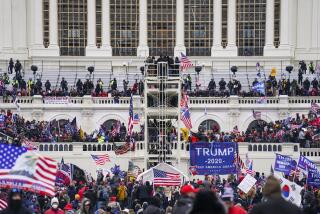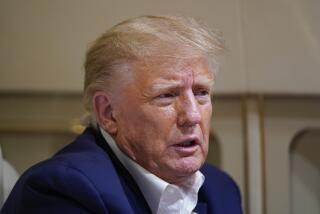Charges May Be Next for Skilling, Source Says
- Share via
HOUSTON — Federal prosecutors may convene a grand jury as early as next week to bring charges against former Enron Corp. Chief Executive Jeffrey K. Skilling, according to an individual familiar with the case.
Neither Leslie Caldwell, the head of the Justice Department’s Enron task force, nor Skilling’s attorney, Bruce Hiler, returned calls left at their offices Friday. And it remains unclear what, if any, charges would be filed against Skilling.
But throughout the investigation into the demise of the $68-billion energy giant, federal investigators have made it clear that the brass ring would be an indictment against either Skilling or Kenneth L. Lay, the company’s former chairman. Through their attorneys, both former executives have repeatedly declared their innocence and neither has been charged in connection with the investigation.
Skilling, 50, had been chief operating officer for four years when Lay announced in December 2000 that his protege would become chief executive in early 2001.
The new job didn’t last long. By summer of that year, Skilling resigned, and by that fall, the company filed for Bankruptcy Court protection, leaving nearly 6,000 people without jobs or retirement savings. As the company’s skyscraper towered vacant over downtown, Enron and a swath of this city’s white-collar workers were forced to start over financially.
Caldwell’s critics -- many of them former Enron employees -- accused her of moving too slowly. But in the last few weeks, crucial indictments have started to fall in line.
One month ago, Andrew S. Fastow, Enron’s former chief financial officer, pleaded guilty to conspiracy to commit wire and securities fraud.
Fastow’s plea agreement included a 10-year prison sentence and was dependent on his continued cooperation with authorities. Fastow possesses unique insider knowledge of misdeeds at Enron and of the role played by the only two people who outranked him: Skilling and Lay.
In testimony before a congressional panel in February 2002, Lay and Fastow invoked their 5th Amendment right, while Skilling didn’t. Skilling said he couldn’t understand what had happened to the high-flying company after his departure, adding that he knew nothing about the misuse of off-the-books partnerships to improperly hide debt and burnish earnings.
At the time of his plea, Fastow told U.S. District Judge Kenneth Hoyt that he had help in cooking Enron’s books, but did not name Skilling or Lay.
“I and other members of Enron senior management fraudulently manipulated Enron’s publicly reported financial results,” he said.
Also last month, Richard A. Causey, Enron’s former chief accounting officer, pleaded not guilty to conspiracy and fraud charges.
Hiler, Skilling’s lawyer, said the task force’s vigor has set a dangerous precedent for heads of corporations.
“It’s an unseemly situation -- a situation people should be concerned about -- that there’s so much pressure to indict people who may not be guilty of anything,” Hiler said in a recent interview. “There’s this pressure because people on TV, who write books or who write articles, have said they’re guilty.”
More to Read
Inside the business of entertainment
The Wide Shot brings you news, analysis and insights on everything from streaming wars to production — and what it all means for the future.
You may occasionally receive promotional content from the Los Angeles Times.










